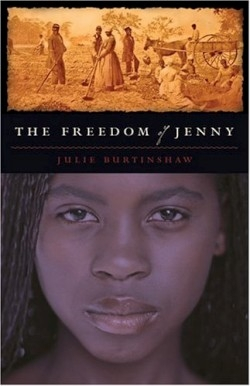
The Freedom of Jenny
“Slave: 14th century, from Medieval Latin sclavus, a captive; a person who is the legal property of another or others and is bound to absolute obedience,” reads a page in this book, which depicts an odyssey from slavery to freedom.
Jenny is born a slave in 1844 on a Missouri plantation, where she soon learns to pay deference to her cruel master while watching her sister denied medical treatment and her mother, Hannah, worked to exhaustion. When her father, Howard, is promised emancipation in exchange for driving cattle to California, freedom becomes more than a distant dream. Howard returns with enough money to purchase his family’s freedom and they make the perilous wagon train trip west to freedom.
In California, Jenny is finally able to attend school but it is a time of unrest in the country, and their freedom is dubious. Howard decides to move his family to Canada, where they are promised freedom under the British flag.
From the book’s beginning Jenny’s father never gives up his dream of freedom and there is a thread of hope throughout, despite the asperity of the family’s life. “‘Baby steps,’ said Daddy. ‘Things happen slowly. Progress walks slowly and sneaks into our lives without us even noticing it.’”
The author adroitly tells two tales—one of a young girl coming of age and the other an account of the insidious horror of slavery. “I don’t know why you people pretend such affection for your children,” Hannah’s owner tells her as her child lies dying. “You don’t see a horse or a dog fretting over their young.”
Burtinshaw is the author of three previous books, Dead Reckoning, Adrift, and Romantic Ghost Stories. This historical novel was inspired by the real-life experiences of Sylvia Stark, who settled on Salt Spring Island, Canada in 1860. Although it is packed with facts—from a list of what they took on their wagon train journey (600 lbs flour, 400 lbs bacon) to stories of the heroes of the time (Dred Scott, Harriet Tubman) and the onset of the Civil War—this book does not become bogged down with minutiae, and the narrative remains fresh.
Burtinshaw’s book would be a fine addition to an upper-elementary or middle-school classroom. In the front of each chapter she includes a word and a definition apropos to the time, such as “emancipation” and “emigrate.” In the back of the book is a list of “did you know?” statements, like “186,000 African American soldiers fought in the Union Army.” She also includes a further reading list of other black pioneers’ stories.
As the book ends Jenny is no longer a slave, yet psychologically it takes her many years before she can fully enjoy her freedom. Jenny will undoubtedly leave readers with a deeper understanding of what it really meant for one human to be in bondage to another in nineteenth-century America.
Disclosure: This article is not an endorsement, but a review. The publisher of this book provided free copies of the book to have their book reviewed by a professional reviewer. No fee was paid by the publisher for this review. Foreword Reviews only recommends books that we love. Foreword Magazine, Inc. is disclosing this in accordance with the Federal Trade Commission’s 16 CFR, Part 255.
